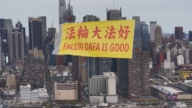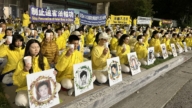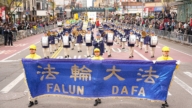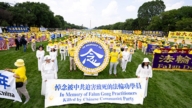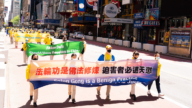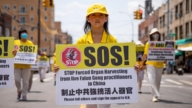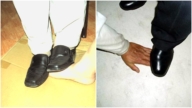【新唐人2013年12月25日訊】中共十二屆人大常委會第六次會議,目前正在審議包括「廢止勞動制度」等多項議案。中共十八屆「三中全會」11月召開後,已宣佈廢止延用半個多世紀的邪惡勞教制度。但有律師指出,遍及中國各地的洗腦班、黑監獄等機關,仍延續著勞教制度的迫害手段。
12月23號至28號,中共十二屆全國人大常委會第六次會議在北京召開。會議將審議包括關於提請廢止《國務院關於勞動教養問題的決定》和《國務院關於勞動教養的補充規定》等議案。
「勞教制度」是中共上世紀50年代,從前蘇聯引進的一個專門迫害人權的非法措施。1955年首次登上歷史舞臺,當時是為了肅清所謂「暗藏的反革命分子」。1957年,中共頒布了《關於勞動教養問題的決定》。
中國資深法學專家趙遠明指出,「勞教制度」自實施後,在「反右」、「嚴打」、「維穩」等各階段,充當著踐踏人權、迫害民眾的罪惡工具,造成冤假錯案層出不窮,冤民遍地。
趙遠明:「尤其到了99年江澤民鎮壓法輪功以來,他利用這個勞教制度大肆的關押迫害,迫害甚至於殺戮法輪功弟子,當然還有異議人士,其他宗教人士,這樣的話,就曝露出這個勞教問題越來越多。」
趙遠明指出,臭名昭著的「勞教制度」還是一個違法、違憲的惡法。自99年前黨魁江澤民迫害法輪功後,大量往勞教所輸血,使得勞教所成了實施酷刑、活摘人體器官的人間地獄。
99年,江澤民集團不惜動用中國經濟資源的四分之一,來鎮壓這個修煉「真、善、忍」的群體。中國各地的勞教所,更是利用集古今中外之大全的迫害手段,從迫害法輪功團體擴展到普通民眾身上。
今年4月,大陸《財經》雜誌刊登了兩萬字的紀實報導《走出「馬三家」》,親歷者口述「馬三家勞教所」人間地獄般的酷刑折磨﹔而中國獨立製片人杜斌的記錄片《小鬼頭上的女人》,也揭露了遍佈中國各地大大小小的勞教所裡,慘絕人寰的各種酷刑黑幕。
中共「勞教制度」的罪行,引發國際的震驚和憤怒。在輿論的壓力下,大陸各地的勞教所開始悄然換牌,並悄悄釋放被關押的勞教人員。
11月15號,中共十八屆三中全會通過的《決定》文,正式提出廢止勞動教養制度。
大陸法輪功學員徐立:「中共的勞教迫害已走到了盡頭,但是,中共的邪惡本質並沒有改變,依然以其他的形式,比如洗腦班,黑監獄,還有以各種形式跟蹤、監聽迫害法輪功學員。」
大陸維權律師江天勇說,勞教制度被廢止,但勞教所的替代品「洗腦班」、「黑監獄」仍大量存在。這一個月來被綁架、抓捕的法輪功學員仍在增加。
大陸維權律師 江天勇:「一個人走在大街上,給你拉到一個麵包車裡面就送到裏面去,家屬根本不知道人到哪裏了,即使根據推測找到了那個地方,那個地方也不會承認人關在裡邊。」
海外「法輪大法」《明慧網》披露,今年上半年,中國法輪功學員被判或送洗腦班的人數,是勞教人數的45倍。
11月19號,大陸83名維權律師就「廢止勞教制度」發表聲明,律師們首次提出國家賠償問題,以及全面取締「法制教育基地」、「法制學習班」等洗腦班及黑監獄對民眾的變相勞教。
12月17號,國際特赦發表報告,對中共宣稱的取消勞教制度表示懷疑。並指出,中共仍然在尋求新的辦法來懲罰同一類人,所謂「取消勞教制度」只能是「換湯不換藥」。
採訪編輯/李韻 後製/孫寧
China’s Brainwashing Centers Continue Labor Camp Persecution
The National People’s Congress has been
discussing a motion to abolish China’s
re-ecucation through labor camp system.
Many lawyers highlight that brainwashing
centers and black jails still exist in China.
These will be places to continue the oppression and
persecution that has taken place in the labour camps.
The sixth meeting of the 12th National People’s Congress
will be taking place in Beijing from December 23 to 28.
The committee began discussing motions,
including the State Council decision on the
re-education through forced labour system.
The re-education through labor system, known as
Laogai, or labour camps, are an illegal apparatus.
This system was adopted from the former
Soviet Union, as a place to conduct persecution.
It was first used by the Chinese Communist Party
(CCP) in 1955, to punish counter-revolutionaries.
In 1957, the CCP officially adopted the system.
Legal specialist Zhao Yuanming indicates that since
the implementation of the labor camps, the CCP has
manipulated the system to persecute Chinese people.
This has happened throughout the
history of the CCP’s political movements.
It has been the source of endless suffering
of victims of miscarriages of justice.
Zhao Yuanming: “In particular, Jiang Zemin
abused the system to the extreme, during his
persecution of Falun Gong, which began in 1999.
The labor camps have been used to detain,
torture and kill Falun Gong practitioners,
dissidents, and people of different faiths.
Many more crimes associated with the
labor camps have also been exposed."
Zhao Yuanming highlights the notoriety of the labor camps,
describing them as illegal, unconstitutional and draconian.
Since Jiang Zemin launched the persecution
against Falun Gong in 1999, he has transferred a
large amount of funds to the labour camp system.
It has become a living hell of
torture and live organ harvesting.
In 1999, Jiang Zemin mobilized a quarter of all state resources.
This was in order to suppress Falun Gong’s practice
of “Truthfulness, Compassion and Forbearance."
Labor camps throughout China have seen
all means of persecution unfold within them.
The system also extended it’s methods from
Falun Gong practitioners to the Chinese citizens.
In April 2013, Lens magazine published
an article called “Out of Masanjia".
It documented the torture seen by eyewitnesses
within the notorious Masanjia Labour Camp.
Independent filmmaker Du Bin also produced
a documentary called, “Above the Ghosts’
Heads: The Women of Masanjia Labour Camp".
This further revealed brutal torture
in labor camps across China.
Falun Gong practitioner Xu Li has
been repeatedly sent to labor camps.
Exposing the crimes and brutality in the CCP’s labor camps
has shocked and stirred the international community.
Under pressure of public opinion, labor camps across China
started to take down their signs, and to release detainees.
On November 15, there was a decision
published from the Third Plenary Session.
It formally proposed to abolish the labor camp system.
Xu Li, Falun Gong practitioner in China: “The labor
camps have gone to the extreme and to the end.
But, the evil nature of the CCP has not changed. The
labor camp system still exists in China, only in disguise.
It still exists in the brainwashing centers and black jails.
It also exists in the spying and monitoring systems that
have been established in the persecution of Falun Gong."
Human rights lawyer Jiang Tianyong says that even though
the labor camp system is disbanding, alternative labor camps
exist, largely as the brainwashing centers and black jails.
For more than a month after the abolition
of labor camps, the number of Falun Gong
practitioners arrested was still increasing.
Jiang Tianyong: “They would simply pull you into a van
while you’re walking on the street and lock you up.
Your family would not know where you were.
Even if your family were able to work out where you were,
no one would confirm it, and you would remain locked up."
Data revealed by overseas website Minghui.org,
suggests the number of Falun Gong practitioners sent
to brainwashing centers during the first half of 2013
was 45 times the number sent to the labor camps.
On November 19, a statement issued by 83 human rights
lawyers in China called for the abolition of labor camps.
The document also put forward for the first time
the issue of compensation from the state.
Lawyers requested to ban all forms of disguised detention.
This includes black jails and, brainwashing
centers, which work under the name of legal
education centers, or legal education classes.
On December 17, Amnesty International questioned the CCP’s
proposal for abolishing re-education through labour in China.
It said it is an approach which is
“changing the soup, but not the medicine."
Interview & Edit/LiYun Post-Production/SunNing


